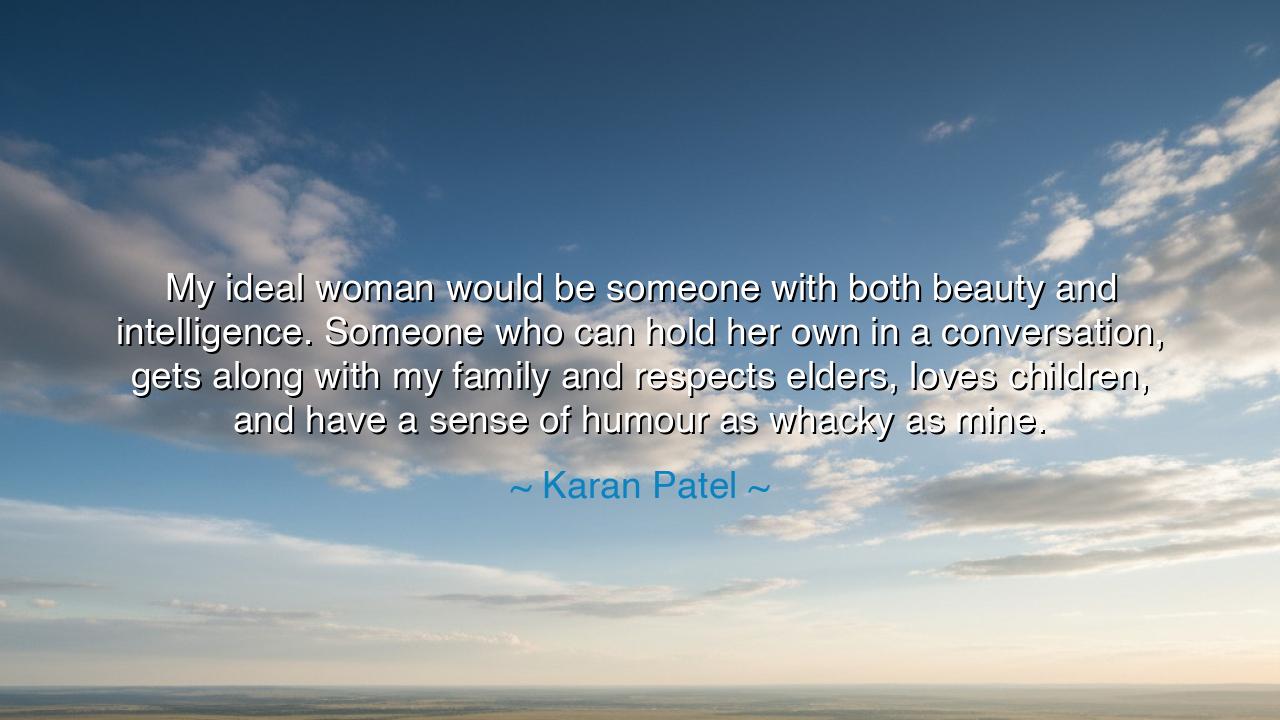
My ideal woman would be someone with both beauty and
My ideal woman would be someone with both beauty and intelligence. Someone who can hold her own in a conversation, gets along with my family and respects elders, loves children, and have a sense of humour as whacky as mine.






The words of Karan Patel, spoken with the candor of a man seeking not perfection but harmony, reveal a timeless longing in the human heart: “My ideal woman would be someone with both beauty and intelligence. Someone who can hold her own in a conversation, gets along with my family and respects elders, loves children, and have a sense of humour as whacky as mine.” In this statement, wrapped in modern language yet ancient in spirit, lies an age-old truth — that love, when genuine, seeks not only passion, but balance. It is not content with outward beauty alone, nor dazzled solely by intellect; it yearns for a union where mind, heart, and spirit dance in harmony.
From the beginning of time, poets and sages have pondered the nature of love and companionship. They saw that beauty draws the eye, but it is intelligence that holds the soul. Karan Patel’s words reflect this same wisdom — the understanding that the ideal partner is not one who merely adorns a life, but one who enriches it. To “hold her own in a conversation” is no small virtue; it is the mark of equality, of respect. For a relationship built upon admiration must also rest upon understanding, where two minds challenge, delight, and grow together. Beauty may fade like the bloom of a rose, but the spark of intelligence, when shared, kindles a fire that endures through years.
Yet, the heart of this quote beats most vividly in its celebration of kindness and family. “Gets along with my family and respects elders” — in this, we hear an echo of the ancient traditions that bind generations together. Love, to be whole, cannot exist in isolation; it must flow outward, touching parents, children, and community. In respecting elders and cherishing children, one demonstrates the humility and compassion that form the foundation of enduring bonds. For no heart that dishonors its roots can ever nurture the blossoms of tomorrow. Thus, Patel’s vision of love is not the fleeting passion of the moment, but a love anchored in the continuity of life.
There is also a sweetness, a laughter, hidden within his wish — “a sense of humour as whacky as mine.” Here lies a truth both light and profound: joy is the breath of love. Without laughter, even the most beautiful bond grows weary; with it, even hardship becomes bearable. To laugh together is to say, “I see you, I accept you, I am at ease with you.” The ancients knew this too — for what is love without mirth? Even in the tales of gods and kings, it is the shared smile, the playful word, that makes affection divine. To find one who mirrors our laughter is to find a reflection of our own soul.
Consider the story of Socrates and Xanthippe, often misunderstood by history. Though his wife was known for her fiery temper and he for his calm wit, their union endured not because they were the same, but because they knew how to engage in the conversation of life. He, the philosopher; she, the realist — together they embodied the eternal dialogue between reason and emotion. Though many mocked their quarrels, Socrates himself said that living with her taught him patience and understanding — virtues no less valuable than wisdom. Thus, we see that love between intellects and opposites need not be perfect to be true; it must only be alive, honest, and resilient.
The lesson that emerges from Patel’s vision is simple yet profound: seek not only a partner of the eyes, but of the mind and spirit. The world teaches us to chase appearance, but the wise know to cherish character. Look for one who can walk beside you in both silence and laughter, who honors where you come from, and who dreams of where you might go together. Beauty may inspire, but respect, humor, and understanding sustain. The love that endures is built not upon infatuation, but upon friendship and shared values — upon the grace of two imperfect souls choosing, every day, to understand and uplift one another.
So, to those who seek love, remember the teaching hidden in these words: your “ideal” is not a fantasy, but a reflection of what your heart values most deeply. Strive to become yourself the kind of person you wish to find — one of depth, warmth, and whimsy. For in the end, like attracts like; the soul finds its mirror in the laughter of another. As Karan Patel reminds us, the truest love is not found in grandeur or perfection, but in shared laughter, mutual respect, and the beautiful harmony of mind and heart.






AAdministratorAdministrator
Welcome, honored guests. Please leave a comment, we will respond soon